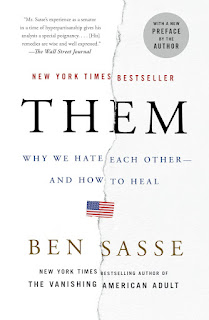"Them: Why We Hate Each Other - And How to Heal" by Ben Sasse. A Review
You might not agree with his politics. You might not agree with some of his assessments. But Ben Sasse, U.S. Senator from Nebraska (R), has smashed the ball over right field and hits a grand slam! "Them: Why We Hate Each Other - And How to Heal", a 288-page hardback, was published in 2018. Sasse understands the troubling trends, and presents them in a winsome way. Chock-full of stories and illustrations, it is also jampacked with analytical detail. Easy to read, easy to digest.
From the introduction to the conclusion, Sasse leads readers to see how our tribes (communities) are collapsing, and in their place are being offered harmful and hostile anti-tribes. As one wades through the chapters, it would be easy to get lost in despair or defeatedness. But the author continues to plow through, while pointing to what is hopeful. His genuine Christian faith is clear-as-day through it all, without making the book a bully pulpit. From the loneliness epidemic, to media and talk-show hosts fueling rage for the purpose of collecting followers and profits, the author sees what needs to be seen, and says what needs to be said. And yet, he holds on to the dignity of those with whom he disagrees.
For Sasse, he perceives that we "are in a period of unprecedented upheaval. Community is collapsing, anxiety is building, and we're distracting ourselves with artificial political hatreds. That can't endure - and if it does, America won't. The alternative is restoring community for our new moment,...it will require habits of heart and mind that introduce neighborliness into a new, more rootless age. It will require us to build new institutions of community that can bond increasingly mobile people together" (236).
When I wrote my last book, "Our Heads on Straight: Sobermindedness - A Forgotten Christian Virtue" I was seeing many of the conditions and actions Sasse records. Therefore, as I read his book (4 years after it was published, and a year after mine was issued), I was relieved to know I wasn't alone in my assessments. Part of his remedy goes well with what I was aiming to present as well: (1) reject anti-identities, (2) put politics in its proper place, and (3) live local (241-53). More can be added to this list, which Sasse does throughout the manuscript.
"Them" is a book for all to read: left, right and middle. It would especially be valuable for those who are sensing that something is way off kilter on the American scene (and I would add, in the Christian sphere), and want to be part of the remedy instead of the disease! This is not about blame-shifting, but recognizing many of the changes of heart-habits, and how to begin right where we live. I emphatically recommend the book.




Comments